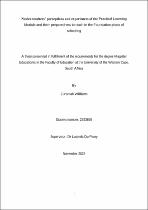Novice teachers’ perceptions and experiences of the practical learning module and their preparedness to teach in the foundation phase of schooling
Abstract
This study explored novice teachers’ perceptions and experiences of a Practical Learning
Module. It addresses the problem of novice teacher efficacy, working from the premise that
teacher quality affects education quality. Theoretically, it is underpinned by Bandura’s Selfefficacy
theory. The study delved into the experiences and perspectives of the unit of analysis,
which are novice teachers, by recognising the importance of self-efficacy, as a crucial
component of effective teaching and learning.
This qualitative interpretive study adopted a single case study methodology, employing
document analysis, semi-structured individual interviews, and focus group interviews for data
collection. Through the analysis of the data, several key themes emerged, including a
misalignment between the official/intended curriculum and its actual implementation, the
theory-practice divide, the transformative experience of navigating two distinct pedagogical
environments (termed “reality shock”), the cultivation of self-efficacy through the agency of
student teachers, and the influence of triadic relationships on novice teacher readiness to teach.
This study attempts to offer valuable insights for the implementation of a more practical
module, which would enhance student-teacher engagement and foster deeper learning
experiences.

